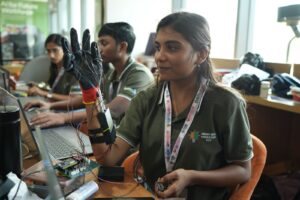Shashi Shekhar (BAJMC 3rd sem)
Nirbhid Foundation, a non-governmental organization operating across India, reflects its core philosophy of “Equality for All.” Established in 2015 by a team of young professionals, the foundation focuses on providing elementary education to children from economically disadvantaged backgrounds. These include children who work, have dropped out of school, or have never had the opportunity to attend. The foundation also engages these children in extracurricular activities, instills moral values and ethics, and prioritizes their overall well-being. To accommodate diverse needs, it conducts classes during the day, evening, and night.

The foundation’s dedicated team ensures that these children receive vital support, including education, clothing, nutritious food, and medical care through health camps. It also offers skill development programs, promotes health and hygiene, and organizes environmental protection campaigns. Through its awareness initiatives, Nirbhid empowers underprivileged children and families in India’s slums and rural areas, equipping them with the tools to build a better future.
As part of a 16-hour volunteering engagement at the foundation, the primary aim was to support students from marginalized communities. This involved providing academic assistance, raising awareness about educational opportunities, and boosting their self-confidence. The teaching sessions were designed to be interactive and focused on the needs of the students.
Activities included initial preparation, where the curriculum and teaching materials for students aged 9 to 15 were reviewed. During classroom sessions spanning 16 hours, Mathematics, English, and Hindi were taught using interactive methods such as concept clarification, hands-on activities, and problem-solving. Personalized attention was also given to students requiring extra support to address specific challenges.

This experience helped develop skills like teaching, communication, time management, empathy, patience, and leadership. However, challenges such as varying academic levels, limited resources like textbooks and multimedia tools, and the need to maintain engagement and discipline during lengthy sessions required adaptability and creativity.
Despite these challenges, the engagement resulted in positive outcomes. Interactive teaching methods increased student engagement and confidence, enhanced academic performance, and strengthened teacher-student relationships. Students displayed greater willingness to participate and independently solve problems, showcasing the effectiveness of the foundation’s approach.






